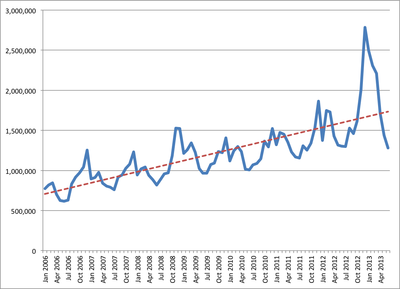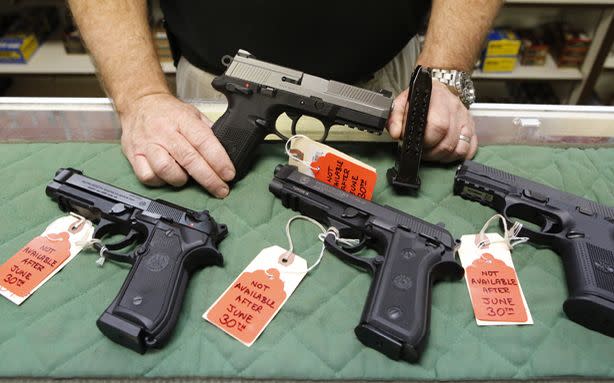Why Have Gun Sales Dropped So Much?
In June, the number of background checks conducted by the FBI — a strong indicator of new gun sales — hit its lowest level since September 2011. The figure was down 54 percent from December 2012, in which more background checks were performed than any previous month in history. But why?
RELATED: Americans Own Nearly Half of the Privately Owned Guns on Earth
There are probably four reasons : Obama, the seasons, gun control, and physics.
RELATED: It's Time We Talked About Gun Control
Using data from the FBI, we created a chart showing the number of background checks per month. This isn't tied directly to sales; Kentucky, for example, requires a new check at the renewal of a gun permit. But it's a good indicator.
RELATED: The White House and NRA Can Agree on This: An Assault Weapons Ban Can't Pass
What we're interested in is that drop at the far right, last month, in which 1.28 million checks were conducted.
RELATED: The Post-Newtown Run on Guns Has Been This Good for the Gun Industry
Reason 1: Gun control
After the massacre at Sandy Hook Elementary, gun sales spiked. That reaction stemmed largely from concerns that the government would institute new restrictions on gun ownership. A look at Google Trends data, which tracks search frequency, bears that out.
RELATED: 62% of Americans Now Support a Ban on Semi-Automatic Assault Rifles and Clips
As BuzzFeed noted on Thursday, retailers agree with this assessment. In an earnings call, sporting goods store Cabela's sees a link between fears of new laws and an increase in purchases. When legislation on gun control went dormant on Capitol Hill in the spring, that impetus diminished.
The increase of background checks since January 2006 is not tied closely to increased discussion of gun control. Extending the Google Trends chart back to that date shows that the December – April spike was perhaps the only one that happened in concert with such concerns.
(And if you were curious, as we were, if the constant increase was a function of population, it isn't. Using Federal Reserve population data, here's the number of checks as a percent of total population.)
Reason 2: Physics
Part of the drop was also regression toward the mean — a return back to the normal pattern. If we take the graph of checks by month and add a trendline, we get the following.
That dashed red line shows how the monthly value moved over time. The June data is far closer to that long-term value than is December. In other words, the decline was partly just deflation, gravity, a return to normal.
BuzzFeed quotes Cabela's CEO, Tommy Millner, who put it well.
The gun business is settling to what I would probably assume to be a new normal, which is elevated above history but not at the fever level that we saw recently, and that’s a good thing.
Reason 3: The seasons
In the chart above, you may have noticed that the June figure is actually below the norm. That's to be expected as well. The number of background checks naturally drops during the early summer. The graph below shows how the trend has moved each year. A brief rise in spring, a drop over the summer, a big run-up to the holidays. We're in the second part of that transition.
Reason 4: Obama
If you look closely, you'll notice one other time over the past seven years that background checks spike a bit more than normal. We've isolated it on the image at right. That brief spike happened in December 2008 and January 2009 — immediately after Barack Obama won his bid for the presidency.
In short, then, the spike in gun background checks over the winter was a bubble, inflated by concerns about the reelection of Obama, about a push for gun control, and due to the normal increase we see for the holidays. The decline is all of that dissipating, and settling back to normal levels. Normal levels, we'll note, which keep climbing higher and higher.


